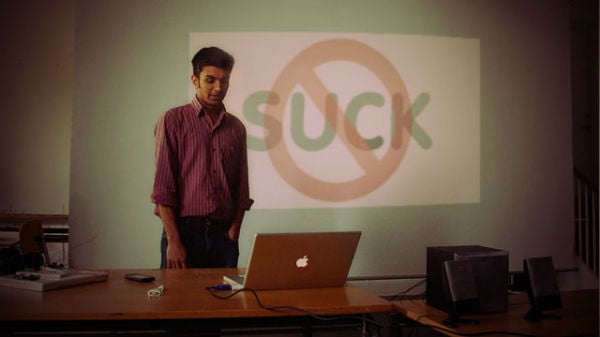
Friday Fun Blog: Toilet Paper Ice Sword Edition
February 26, 2016
How to Correct Those Worrisome Security Missteps (Infographic)
March 2, 2016My name is Samantha Walters and I am what you would consider a “millennial executive” over here at Colocation America. Every Monday (get it, get it, Samantha on Mondays – the S.O.M column) I will write a little something on whatever is on my mind from business practices to current events and everything else in between.
This week’s topic is part two of my guide to sales:
In case you missed last week’s article, here is what I said summed up in 10 words: 75 percent of sales people suck and forget I’m human.
Now, hold up, let’s stop there.
If you had a chance to read the article (shameless plug No. 2) you may have noticed that it was all about how to talk to potential clients. I mean, really talk to them. You know, the kind of talking where you do not need use sales-pitch clichés like “thinking outside the box” or “the bottom line.” More importantly, the article highlighted the importance of building relationships with potential clients.
Which brings me to my next part of Samantha’s Guide to How to Not Suck (as a Salesperson).
Part 2: Listen
As any happy couple can tell you, a successful relationship is all about two things:
- Speaking Your Mind
- Listening
Ok, ok, I just made that up but it sounds good, right? Honestly, I know nothing about romantic relationships but I do know business relationships and here is what I know—be transparent and truthful but, at the same time, be willing to listen to new suggestions and ideas. Any successful business relationship, like any other, requires both parties to give a little to get a little.
In sales, it’s no different. Tell me if I’m wrong but the salesperson, being you, is looking for the potential client to give you information about their company and the current problems they are facing. When the client gives you this information, they are looking for you to do one thing: listen.
Here is the trick—the client will tell you everything you need to know on that first call.
Let’s be real, “listen” can mean anything to anyone. But let me break it down for you, you need to listen to everything. And by everything, I mean the client’s tone, their phrasing, the terms they use, and, without a doubt, the problems they want you (and, clearly, your product) to solve.

Photo Credit:: quotefancy.com
Here is the trick—the client will tell you everything you need to know on that first call. Don’t believe me? Think about it. Think of the last first call you had. My guess is that you learned about the client’s company, what systems and/or products they are currently using, and the problems they are facing (essentially, the “why” in the “why I need you” speech). So, great, you got the information you need for that very confusing, 10-page proposal you are going to send.
But, Here’s the Thing, Did You Listen?
Did you listen to the passion in their voice when they talked about their business? Is this a person you can have fun with or are they all business talk? Heck, did they even seem interested in your product on the call?
Most times, without even noticing it, potential clients say a lot about their company and how they do business. For example, when I am on a call, I am the most transparent person you will ever have the opportunity to work with (or so I hope). I mean, I give the guy/gal everything they need to know about pitching to me. I tell them a quick history of the company, a long-winded “why” we are talking, and, even, a projected timeline, followed up with a “best way to reach me” spiel. I mean, I even say “do not put me as a high-projected close rate—be the hero to your boss by closing me when you put zero percent probability.”
And yet, lovely sales people seem to still get it wrong. I can tell them exact dates we will close and all the pitfalls we are going to hit, and yet, I find myself repeating it on every call and in every email. Dear, oh dear, salespeople, why is it so hard for you to hear? Seriously, if I get asked one more time “when can I expect a signature?” or be told that “I told my manager that I would close you….” I might throw a five-year-old tantrum.

Photo Credit: thomholland.com
With that said, there are exceptions to this whole “client is always right” mentality. Although the client may say something, and you heard them, you may still have to disagree or steer the conversation in a certain way that makes actual sense—you are the expert. Oh, and using a client’s own words to make your point is always acceptable (as long as you do not come across as, well, an assh–e).
A great sales person knows, and walks, that fine line between listening and, well, speaking.
Now don’t get it wrong—clients always have great ideas and they always know what’s best for their business. Then again, if we did, we would not need you, right? If you are truly listening to your client, then you will know when to be the expert and when to silently nod and (remember, as you are probably on a conference all) to say a loud “yes.”
A great sales person knows, and walks, that fine line between listening and, well, speaking. They also know when to bend the line.
Every once in awhile you can pull the bonus card (Happy Hump Day, Saad), and tell a client that they are flat out wrong, using their own words (How’s it going, Devin?), and, hey, you can even speak entirely in memes (Hey, Spiceworks team). Whatever you and your client do together is between you two. Ok, now I am making this seem a little intense. To sum it up, build a relationship and a common ground that works for you and your client.
Remember, It’s Easier to Sell to a Friend Then to a Stranger
To highlight this point, here is a story: About four or five years ago, I reached out to an online community to see how I could advertise with them (or so I remember). Immediately, a friendly voice jumped on the phone and we got to talking. At the time, this online community was, let’s say, millions of dollars poorer and the salesperson was also your account manager and besides that, there was no one else on your “team.” Believing this outlet as an awesome opportunity, I jumped at the chance to work together. That first campaign was one for the record books—it completely bombed. (I think we still hold the record for worst campaign.)
Guess what? We still work together today. Surprised? Well, don’t be.
Without going into too much detail, it was all because of our strong relationship. Every once in awhile you hit it off with an individual and immediately become friends—this was one of those moments. But it was not because of the pre-campaign relationship we had established but, rather, what she did during that first campaign that makes me still work with her today. I trust that she will work with my team to help create the best experience possible.
And so far, so good.
But, before I go, I have an ask for you lovely salespeople: Next time we chat, think of these two pieces I have written. After all, we all know you checked my LinkedIn before the call.
